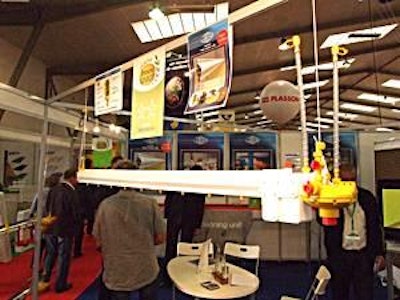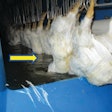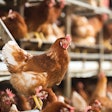
The International Trade Show for Livestock returned to Rennes in mid-September, and this year was as busy as ever.
Broiler producers were generally in good spirits, while layer producers had welfare on their minds as the deadline for the conventional cage ban looms. 75% of the major players have now either moved to larger cages/ deep litter systems.
Operators are finding, however, that they have more broken eggs with the new cages, commented Alain Reocreux , international sales manager for Brittany–based Olmix. Additionally, with deep litter systems, cleaning out and disinfection only takes place annually so disease problems are greater than with cages, which can be cleaned more frequently.
Another serious problem with deep litter is that a lot of dust is generated. Ammonia is also present in the house environment, from birds’ droppings. The dust particles are inhaled by the birds and scratch the mucous membranes so facilitating absorption of ammonia. Furthermore, mycotoxins are “tied” to the dust and so also are absorbed as the birds breathe.
The SPACE exhibits reflected the way industry is moving, with many equipment manufacturers displaying deep litter systems. Some traditional cage systems were on show, given that these are still in use in non EU countries, for example the francophone countries of North Africa.
Innov’Space
Each year, Innov’Space, the event’s award initiative, seeks to recognise innovative products displayed at the show.
Amongst this year’s winners was Lubing International, which gained a two star award for its Twin Clean Line watering system.
The water pipe in the system doubles as a support and, being made of smooth plastic, is easy to clean. Nipples are made of stainless steel, promoting hygiene and, in addition, the nipple itself has a large diameter allowing a good flow of water.
Lubing was also awarded a single star for its egg conveyor cleaning unit. The company makes conveyors that can be hundreds of metres long. The chain links may be galvanised, plastic coated or be given a special coating. To ensure maximum health and hygiene, Lubing has developed a compact cleaning unit which can be installed on a straight conveyor section. The conveyor chain is cleaned and disinfected as it passes through the cleaning unit.
E-CAT was also awarded one star for its Wiseman egg candling unit, which can automatically identify live and dead embryos, using laser candling, which has a very high level of accuracy. The machine has a throughput varying from 10,000 to 50,000 eggs per hour.
“The big advantage of automatic machines is that they are far more accurate and reliable, compared to when these tasks are carried out manually, as labour can be unreliable,” the company notes.
Fellow French concern Id Projects Avinno of Ploudaniel also makes egg identification equipment and it picked up one star recognistion with its Twin Avinnovo offering .Its machine is extremely compact – 2m long x 1.20m wide, and can handle more than 75,000 eggs per hour.
Proper illumination in poultry houses is vital as, without it, tasks can neither be performed properly or quickly. Additionally, diseased birds are harder to identify in poorly lit environments. Sodalec’s Avilight system, given a one star rating, is an LED system which offers not only brightness but also low power consumption. The units come in one piece and provide uniform and powerful illumination. Furthermore, LEDs have a life of over 50,000 hours.
Insect infestation can be a major problem with flies breeding in droppings, hence the need for developing larvae to be killed. Ocene’s Larvicide Kit (one star) sprays larvicide via a pump on to the droppings as they pass along conveyors. Spray rates can be varied -20litres, 50litres and 120litres/hour and, in addition to larvicides, deoderizers can be sprayed on to the conveyors.
Disposing of dead birds can be a dirty job. Many farms rely on outside contractors to remove dead birds and it is vital for biosecurity that hauliers do not come onto the farm. Agrimage has come up with an ingenious solution to this problem, its Ekar Bac Revolution system.
The system is based round a 770 litre capacity polypropylene bin, with castor wheels at the base and fitted with a hinged lid. The bin is also fitted with a counterbalanced lifting frame.
The haulier winches the bin up using the truck’s own crane, over his truck, and when in position, the farmer pulls a long cord which is attached to the frame, allowing the bin to tip through 180 degrees, emptying itself. The bin then returns to its vertical position, lid closed, is winched up, and then lowered back to ground level. Consequently, the haulier never leaves the truck and the farmer can pull the cord standing well away from the truck. This is a very ingenious concept and, given the increasing significance of strict biosecurity protocols, the product should have merited a two star award rather than the single star it received.


















